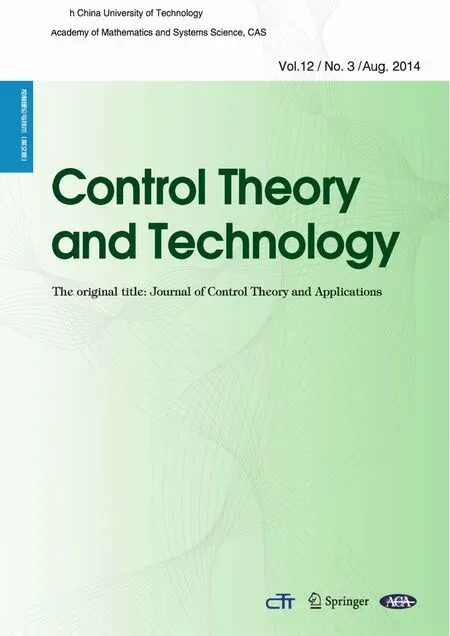Special issue on recent advances in hybrid control theory and applications
Editorial
Special issue on recent advances in hybrid control theory and applications
The demands of a rapidly advancing technology for faster and more accurate controllers have always had a strong influence on the progress of automatic control theory.In recent years control problems have been arising with increasing frequency in widely different areas,which cannot be addressed using conventional control techniques.The principal reason for this is the fact that a highly competitive economy is forcing systems to operate in regimes where presence of large uncertainties as well as nonlinearities plays a major role.For instance,the design of unmanned aircraft,unmanned underwater vehicles,and automatic driving systems for automobiles are all typical examples of such difficult control problems.The large uncertainties concerning the plant may arise due to large external disturbances,large parameter variations because of faults in the system,or failure of some of the subsystems.In such cases,the controller has to determine the specific situation that exists at any instant,and take the appropriate control action.Accomplishing this rapidly,accurately,and in a stable fashion is the objective of control design.
Broadly speaking,the above problem is still one of adaptive control in which,typically,controller parameters are adjusted on the basis of plant parameter estimates.However,if conventional adaptive control is used,experience indicates that the presence of large parameter errors will generally result in slow convergence,with large transient errors.Several approaches have been proposed to deal with such problems.Forinstance,the methodology of multiple models,switching,and tuning originated by Narendra at Yale utilizes multiple models to identify and control the unknown plant,the hybrid system control proposed by Varaiya,Sastry and others at Berkeley combines hierarchical controller and conventional continuous-time controllers,and supervisory control advocated by Morse at Yale involves logic-based switching between many fixed conventional controllers.All of them are somewhat similar but the details are different.Only the future can tell which of them is ideal for a given application.
One of the distinctive features of these approaches is their hybrid nature,namely coupled discrete logic with the analog physical environment.Hybrid systems refer to a class of complex systems that involve interacting eventtriggered discrete logic and time-triggered continuous dynamics.They are important in applications in embedded systems,robotics,manufacturing systems,traffic management,bio-molecular networks.This requires the development of new design techniques that can guarantee desirable specifications of these kinds of heterogeneous dynamical systems,since traditional methods,which are capable of dealing with either purely continuous-variable or discreteevent systems,are not suitable here.Therefore,hybrid systems have recently attracted a lot of attentions from computer scientists and control engineers.
In the past few years,a lot of research efforts have been devoted to this field and significant advancement has been made.This special issue intends to reflect part of those achievements.In particular,this special issue consists of 7 papers,which were selected among around 20 papers presented on the subject of hybrid systems at the 2014 11th IEEE International Conference on Control&Automation(ICCA)held on June 18-20,2014,at Taichung,Taiwan.We hope that the special issue will promote the research interest in hybrid control theory,and foster new applications of hybrid systems.
DOI10.1007/s11768-014-4000-1
Special issue editor:
Cheng Xiang
National University of Singapore
Singapore
©2014 South China University of Technology,Academy of Mathematics and Systems Science,CAS,and Springer-Verlag Berlin Heidelberg
 Control Theory and Technology2014年3期
Control Theory and Technology2014年3期
- Control Theory and Technology的其它文章
- Progressive events in supervisory control and compositional verification
- Passivity-based consensus for linear multi-agent systems under switching topologies
- Introducing robustness in model predictive control with multiple models and switching
- Design of two-layer switching rule for stabilization of switched linear systems with mismatched switching
- On the ℓ2-stability of time-varying linear and nonlinear discrete-time MIMO systems
- A noninteracting control strategy for the robust output synchronization of linear heterogeneous networks
